University of Arizona Sarver Heart Center awarded six Investigator Awards totaling more than $95,000 for the 2020-2021 grant cycle. These competitive research projects focus on advancing knowledge in the areas of heart muscle development and interventions, including cardiomyopathies, sudden cardiac arrest, congenital heart disease and stroke.
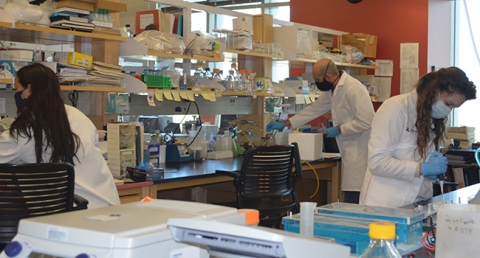
“Our generous donors ensure the Sarver Heart Center Investigator Award Program continues to thrive. Many types of donors and many types of gifts support this program, which in the past has allowed us to award as much as several hundred thousand dollars in funding during individual grant cycles. We reserve this funding for early career investigators and trainees, to fund pilot projects typically leading to large external grant awards, and to provide critical bridge funding to successful investigators between grant awards. We value every gift to our Investigator Awards program, which is a prized program of the SHC, but most coveted are planned endowments that provide investigator award funding not only now, but into the future,” said Nancy K. Sweitzer, MD, PhD, director of the UArizona Sarver Heart Center and chief of cardiology.
Sarver Heart Center Investigator Awards provide variable amounts of funding from a few thousand to tens of thousands of dollars. The return on investment for this program is typically about 10 to 1, said Dr. Sweitzer.
Projects Funded for 2020-2021
Note: all projects are at the UArizona College of Medicine – Tucson, except for the Margarito Chavez Award at the College of Medicine – Phoenix.
Sex-specific modifications of titin under HFpEF-inducing metabolic stress
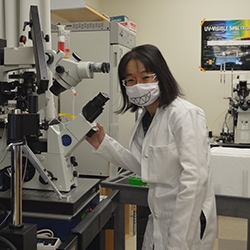
Donors: Frank and Alex Frazer Cardiovascular Research Award; William and Dorothy Shaftner Cardiovascular Research Award
Heart failure with preserved ejection fraction (HFpEF) is a complex clinical syndrome with high prevalence among women, particularly those with high blood pressure, diabetes or obesity. This type of heart failure is increasing in prevalence as the population ages, and has no proven treatments as of 2021. Dr. Methawasin’s long-term goal is to better understand the cause of HFpEF and identify new targets for effective drug therapy. This proposal will examine the impact of gender and postmenopausal status on titin modifications in animals exposed to high blood pressure and obesity. The Granzier Lab is world-renowned for the study of titin, a heart-muscle molecule that works like a molecular-sized spring that recoils and regulates the stiffness of the heart.
Novel High-throughput Screen for Detection of MyBP-C Binding Interactions with Myosin
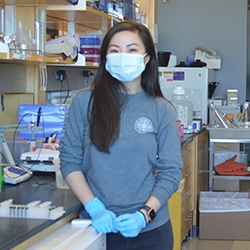
Donors: Billington and Doris Griswold
Hypertrophic cardiomyopathy (HCM) is the most common form of hereditary heart disease, affecting one in every 500 individuals. HCM is caused by mutations to genes controlling cardiac muscle contraction and relaxation. One of the most common proteins mutated in HCM is myosin-binding protein C (MyBP-C), thought to be responsible for as many as half of the HCM cases where a gene mutation is identified. Wong is working to develop a high-throughput screening assay that detects disrupted interactions between critical heart proteins caused by these mutations. “This grant will be used to establish a novel screening tool that can be used to understand how phosphorylation of MyBP-C regulates binding of myosin to other proteins and how this binding is disrupted in HCM mutations,” said Wong, a graduate research assistant in the Colson Lab. “With the knowledge gained from our assay, we have the capability of personalizing medicine by screening libraries of potential drugs for restoration to normal when disrupted binding is caused by HCM.”
Developing a strategy to prevent the loss of leiomodin 2 due to a pathogenic human mutation
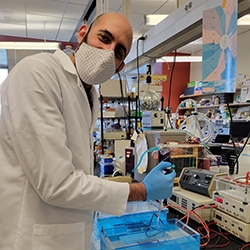
Donors: Endowments of William “Billy” Gieszl, and Walter and Vinnie Hinz - Pediatric/Congenital Heart Disease Award
Working with an individual patient’s induced pluripotent stem cells (iPSC), Dr. Pappas is collaborating with Drs. Churko and Gregorio to obtain a more complete understanding of how a mutation in a protein named leiomodin 2 (LMOD2) leads to dilated cardiomyopathy, a condition in which the heart muscle becomes weakened and enlarged so the heart cannot pump enough blood to the rest of the body. “The aims of this project are to: 1) decipher why a pathogenic human mutation in LMOD2 leads to its absence in heart cells resulting in severe neonatal dilated cardiomyopathy and 2) develop strategies to restore LMOD2 protein levels in heart cells in order to improve cardiac function and perhaps prevent disease in persons affected by these mutations,” said Dr. Pappas.
Electropneumatic Cardiac Organoid Stimulation Apparatus (EPCOSA)
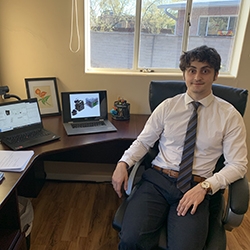
Donors: Steven M. Gootter Foundation - Sudden Cardiac Death Research Grant
This innovative project involves building a system that allows formation of engineered heart tissue using heart cells generated from human induced pluripotent stem cells (iPSC). This is particularly useful for understanding patient specific heart diseases since this system will use cells isolated from heart disease patients. In this model, human iPSC derived heart cells will grow on a 3D-printed scaffolding until mature. Subsequent mechanical and electrical stimulation of the engineered heart tissue will allow measurement of physiological parameters necessary for proper heart function. “This system employs active mechanical and electrical stimulation to work toward more physiologically accurate 3D heart geometry. This concept will allow our laboratory to perform high throughput drug screening and model heart disease at the tissue level,” said Dr. Churko.
Examining how a nemaline myopathy-linked mutation disrupts the functions of Tmod family proteins
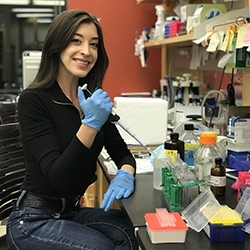
Donors: The Finley and Florence Brown Endowed Research Award
Actin is one of two primary proteins involved in heart muscle contraction. Actin molecules bind together to form the thin filament of heart muscle and skeletal muscle (most of the large muscles of the body). Improper actin-thin filament lengths lead to human heart and skeletal muscle diseases. Building on previous research in the Gregorio Lab, this project will examine how mutations affect the function of proteins binding to actin. The project will explore how mutations and altered protein interactions affect the function, assembly, and ability to regulate thin filament lengths critical to contraction. “Our research will reveal novel insights into the relationship between thin filament protein mutations, the length of the thin filament and the development of contraction abnormalities, with the hope of identifying new therapeutic targets for muscle diseases,” said Schultz.
Selective MMP-9 inhibition as a novel treatment for human brain endothelial cell survival post ischemic-like injury
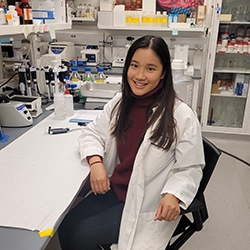
Donor: Margarito Chavez Undergraduate/Medical School Student Award
After stroke, the opening of the blood-brain barrier is a key compromising event that leads to a vicious cascade of secondary brain injury, contributing to risk for further damage due to blood vessel dysfunction, bleeding into the brain, and irreversible damage. Matrix metalloproteinase 9 (MMP-9) is a protein that has been implicated as a culprit in mediating this breakdown of the blood-brain barrier, but the use of inhibitors of matrix metalloproteinases have not been effective in clinical trials. A recently discovered small molecule inhibitor, JNJ0966, provides an opportunity to pharmacologically evaluate highly selective MMP-9 inhibition to determine whether it can help preserve the blood-brain barrier during stroke. “We hypothesize that targeted inhibition of MMP-9 by JNJ0966 will improve survival and function of cells lining the blood vessel of the brain following an injury caused by low oxygen and glucose levels, a model of human stroke,” said Sin.

